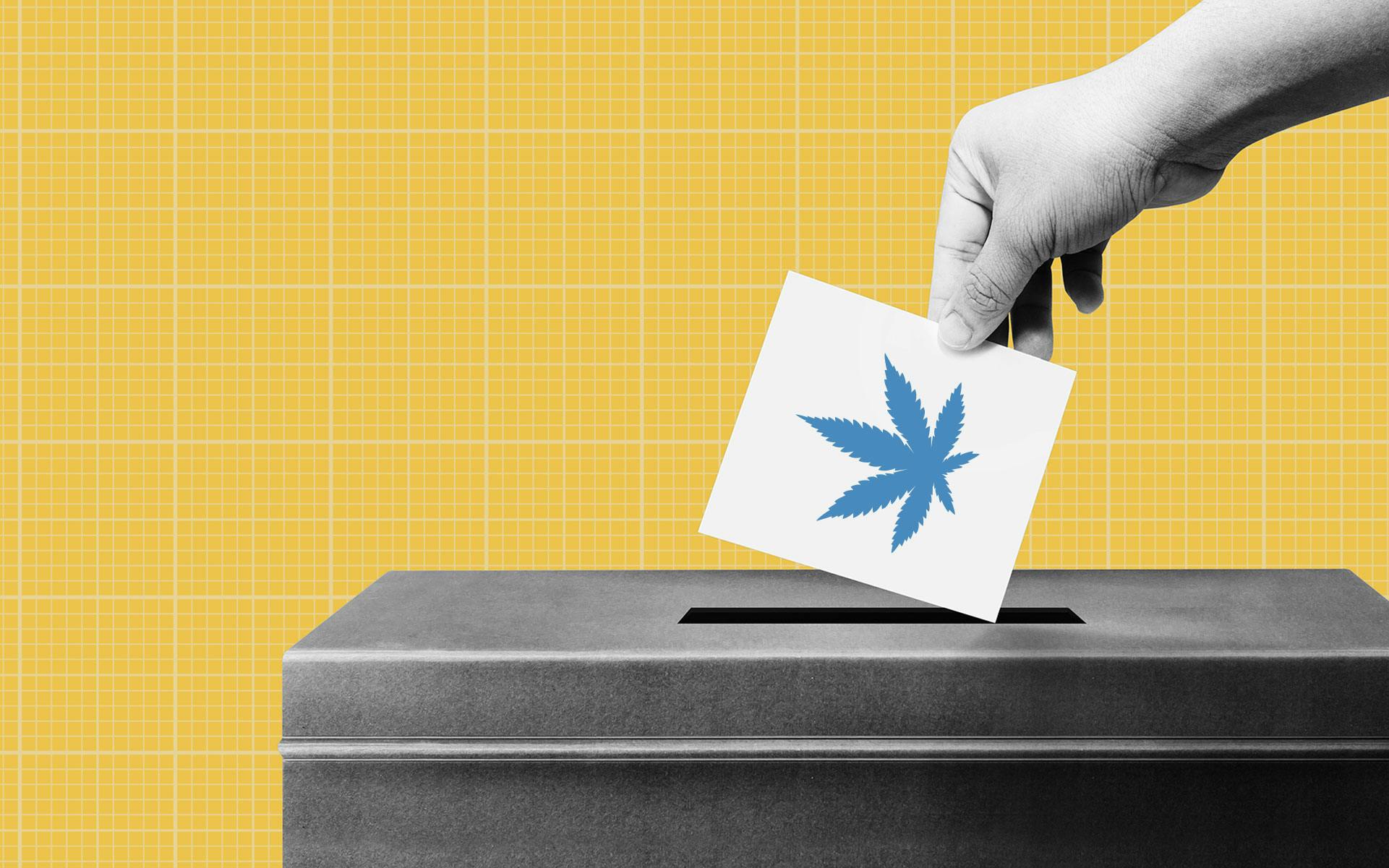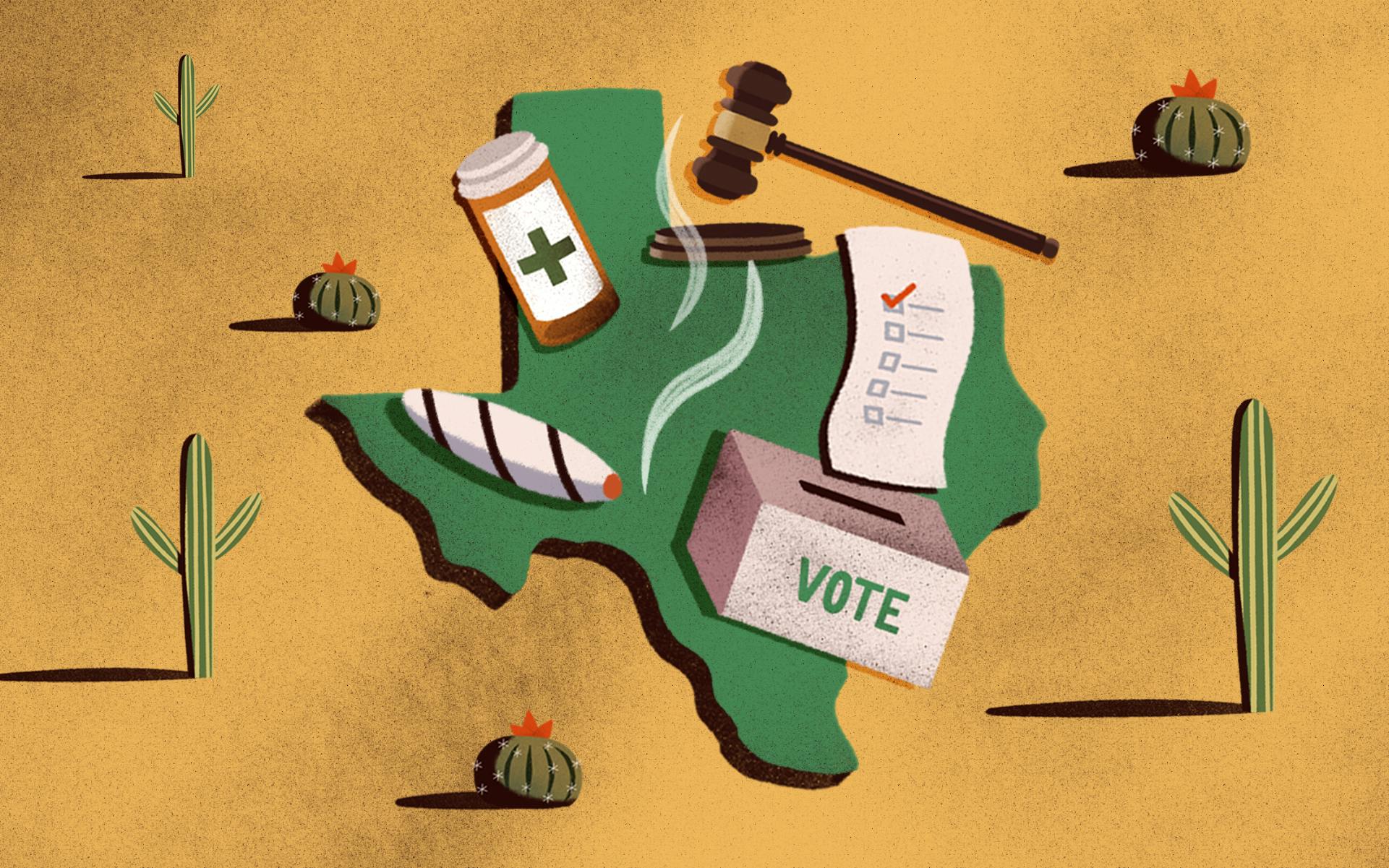Is marijuana legal in Texas?
Current legality status
illegal
Cannabis is illegal under state law.
Marijuana is not legal in Texas. Recreational use is prohibited. Narrow medical exceptions apply to low-THC/high-CBD product use and possession by qualified, severely ill patients.
The penalties for marijuana in Texas are very steep. Personal possession of under 2 oz of raw marijuana flower can result in a misdemeanor conviction, up to 180 days in jail, and a $2,000 fine. Possession of 4 oz results in a mandatory minimum 180 days in jail.
Cultivation penalties are based on the plant’s entire weight—which can mean mandatory jail time for a single plant.
You can get a $500 fine just for a pipe.
You can get a minimum 180 days in jail for having a THC vaporizer cartridge from California. If you make or sell any concentrated cannabis, even just bubble hash, it’s a felony minimum 180 days in jail. Making a measly four grams or more of hash triggers a minimum five-year prison sentence.
Sentence enhancements kick in for involving anyone under age 18, or being near a school. And any drug offense triggers a driver’s license suspension.
Don’t mess around in Texas, which had 64,949 marijuana arrests in 2016.
Texas does have a limited medical cannabis card program that allows low-THC/high-CBD for qualifying patients.
Texas recreational and medical marijuana legalization efforts
Texas recreational and medical legalization efforts are slow going. Changing the law requires an act of the legislature, which only meets every two years for 140 days. Texas has no ballot initiative process like California. There’s currently no active legalization bill to support, and the last policy reform bill did not pass.
Shop highly rated dispensaries near you
Showing you dispensaries nearSeveral Texas senators and house representatives are up for re-election in the fall of 2020. Both pro and anti-cannabis candidates are either up for re-election, or challenging incumbents. More pro-cannabis representatives could advance reforms. This demonstrates the importance of voting in local races. Texas residents can register to vote here.
In 2019, a decriminalization bill overwhelmingly passed the House but died in the Senate.
Support for medical is high and recreational is growing. Some 73% of Texans in a 2019 Emerson poll supported at least medical cannabis legalization; 38% supported adult-use. Just 14% supported ongoing prohibition. Even 62% of Republicans in a Texas Tribune poll support reducing punishments for pot possession.
Local decriminalization in Texas
A number of Texas cities have enacted cannabis decriminalization policies. However, Texas drug laws emanate from the state, not local, law. In response, the city of Austin formally defunded pot arrests by its local police department in July 2020. A number of large cities have cite and release policies, or drug diversion, for first-time personal possession.
Delta-8 laws in Texas
Delta-8 is not legal in Texas. Delta-8 exists in a legal gray area because it is often extracted from hemp, which was made legal in the US with the 2018 farm bill, however, some individual states have specifically outlawed delta-8 regardless of this law, including Texas
On Oct. 15, 2021, the Texas Department of State Health Services (DSHS) amended its Consumable Hemp Program guidelines to classify products with any amount of delta-8 THC as Schedule I controlled substances, along with any plant containing more than 0.3% delta-9 THC. The move shocked the state’s robust delta-8 industry, which believed it had been operating within the scope of state and federal law.
Texas cannabis DUI laws
Like everywhere else, it’s illegal to drive while under the influence. Cannabis is a controlled substance in Texas, and you can’t drive intoxicated on a controlled substance. “Intoxicated” is defined as “not having the normal use of mental or physical faculties by reason of the introduction of … a controlled substance.”
In Texas, it is implied that the driver shall consent to a chemical test of their breath, blood, or urine for the purpose of determining the presence of drugs and/or alcohol. However, an individual suspected of being under the influence of cannabis has the right to refuse to submit to a chemical test, and no penalties or sanctions apply for refusing to submit to chemical testing for drugs. But refusing testing can be used against you in court.
The penalties are severe for intoxicated driving on any substance, starting at a minimum six days in jail if you don’t hurt anyone. If you hit and kill a cop while drunk, you’re doing at least five years in prison and a maximum $100,000 fine.
A second DUI triggers an automatic 30-day jail sentence, and a third puts you away for a minimum of two years.
Common questions about marijuana legalization in Texas
People have questions about edibles, CBD, hemp, and medical cards in Texas—here are the details.
Are edibles legal in Texas?
No. Edibles, like pot brownies, are very much not legal and come with severe jail time based on the weight of the plate of brownies, not the weight of the THC inside. This could result in prison time for a first offense.
Is Texas a legal recreational state?
No, Texas is not a recreational weed state. It’s an extreme prohibition state.
Is CBD legal in Texas?
Yes, CBD is legal in Texas if it has under 0.3% THC. State lawmakers followed federal hemp legalization laws, and Texas has begun licensing hemp farms and manufacturers under House Bill 1325. CBD products from the national market are widely available, but loosely regulated.
Is Delta-8 legal in Texas?
No, Delta-8 is not legal in Texas.
Is smokable hemp allowed in Texas?
No, smokable hemp is prohibited in Texas under a 2020 rule.
Can you get a medical marijuana card in Texas?
Yes. The severely ill may apply for a medical card for low-THC products (less than 0.5% THC) through the Texas Compassionate Use Program. The program is very limited.
What are the medical program’s qualifying conditions?
The qualifying conditions for Texas’ medical marijuana program are:
- Autism
- Amyotrophic lateral sclerosis (ALS), or Lou Gehrig’s disease
- Incurable neurodegenerative disorders
- Intractable epilepsy
- Spasticity
- Multiple sclerosis
- Seizure disorders
- Terminal cancer
Learn more about marijuana legalization in Texas
Here are some additional resources, news, and references for Texas marijuana policy.
- The Texas penal code punishments
- Texas penal code – marijuana designation, types of offenses, penalties
- The National Organization for the Reform of Marijuana Laws’ Texas page
- Texas’ NORML chapter is a 501c4 trans-partisan educational nonprofit
- The Texas State Law Library
- Texans for Responsible Marijuana Policy
- Marijuana Policy Project’s Texas page
Keep up with the latest news about legalization in Texas
Stay current on Texas’ fast-changing laws by bookmarking Leafly politics and signing up for our newsletter.
By providing us with your email address, you agree to Leafly's Terms of Service and Privacy Policy.


